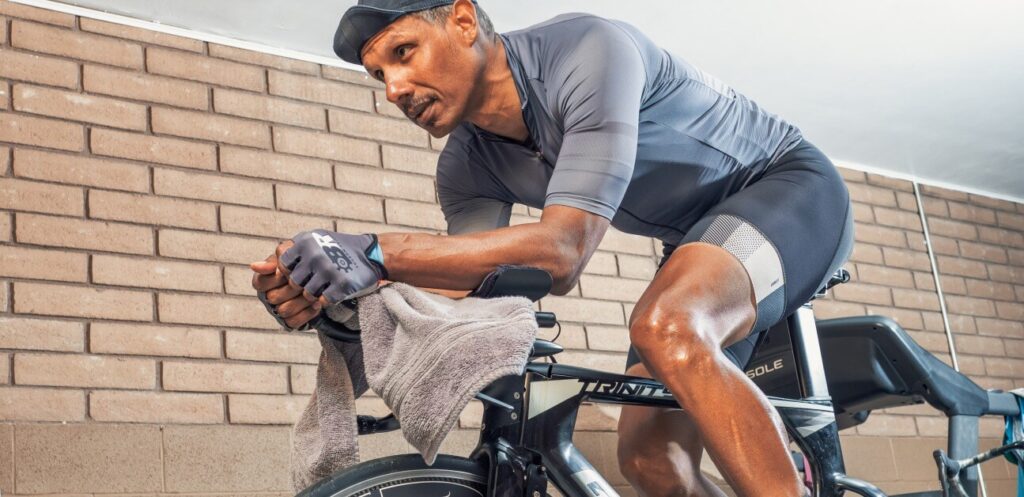What is a Good FTP and How do I raise it? (Comparison Charts)
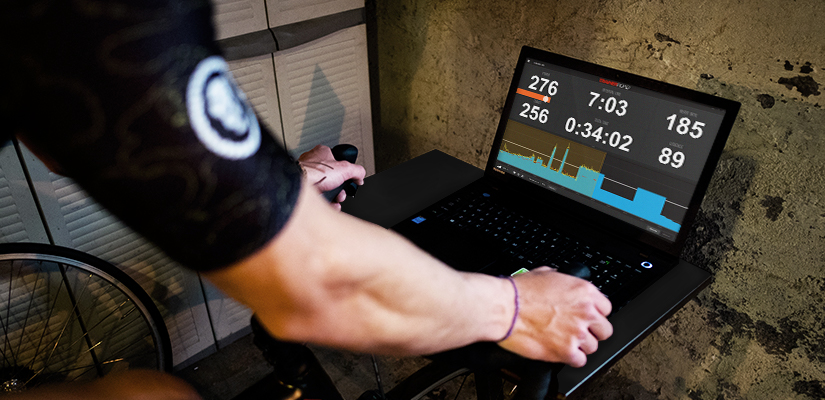
When it comes to cycling fitness, few numbers spark more discussion than Functional Threshold Power (FTP). But what exactly is FTP, and why does it matter so much? In this article, we’ll walk you through what FTP is, how to test and improve it, and how TrainerRoad helps athletes of all levels raise their FTP and get faster.
What Is FTP (Functional Threshold Power)?
Functional Threshold Power (FTP) is the highest average power you can sustain for about an hour, measured in watts (W). It represents the point where lactate production and clearance are nearly balanced—sometimes called your lactate threshold. While FTP isn’t the only metric that matters, it gives a reliable snapshot of where your cycling fitness stands right now.
Why FTP Matters
- Personalized Intensity: Your FTP is a personal benchmark, ensuring your workouts target just the right intensity.
- Easy Progress Tracking: Regular FTP assessments let you see tangible improvements in your power output over time.
- Foundation for Structured Training: FTP guides the creation of training zones, so every workout is tailored to your current fitness.
Coach Jonathan Lee defines FTP:
The Importance of FTP in Tracking and Improving Fitness
At TrainerRoad, we use your FTP to customize every workout, guiding you toward steady progress and tangible gains on the bike. By focusing on the right intensities, you don’t just train harder—you train smarter. The result is maximum returns on your training investment—no wasted time, and a stronger engine that can deliver real-world benefits.
What Does a Higher FTP Mean for You?
- Higher Average Speeds: A stronger aerobic engine helps you maintain faster speeds. Not only does a higher FTP make you faster, with the right training, it can make tackling hills more efficient. Allowing you to hold a steadier pace and arriving at the top with more in the tank.
- Resilience: Whether you are facing headwinds, attacks, or repeated punchy climbs, a higher FTP and targeted training gives you the resilience and power needed to conquer demanding terrain and full-throttle races.
- Better Energy Expenditure: The more power you produce the more calories you burn. As your FTP grows and you get faster, you will be burning more calories on every ride.
Adaptive Training
Get the right workout, every time with training that adapts to you.
Check Out TrainerRoadWhat Is Considered a Good FTP?
Understanding ‘Good FTP’ Values and Power-to-Weight Ratios
It’s natural to want to know how your FTP compares to other cyclists. Keep in mind, FTP is not the “be-all-end-all” measure of performance and that everyone’s starting point is unique. Being at a lower FTP now doesn’t mean you’re stuck there. Just like the first time you take on a steep climb, with consistent training you can look back months later and be amazed at how far you’ve come. We’ve included FTP charts that account for all TrainerRoad athletes.
How Does My FTP Compare?
You can compare with other athletes using our W/kg Calculator and the comparison charts below.
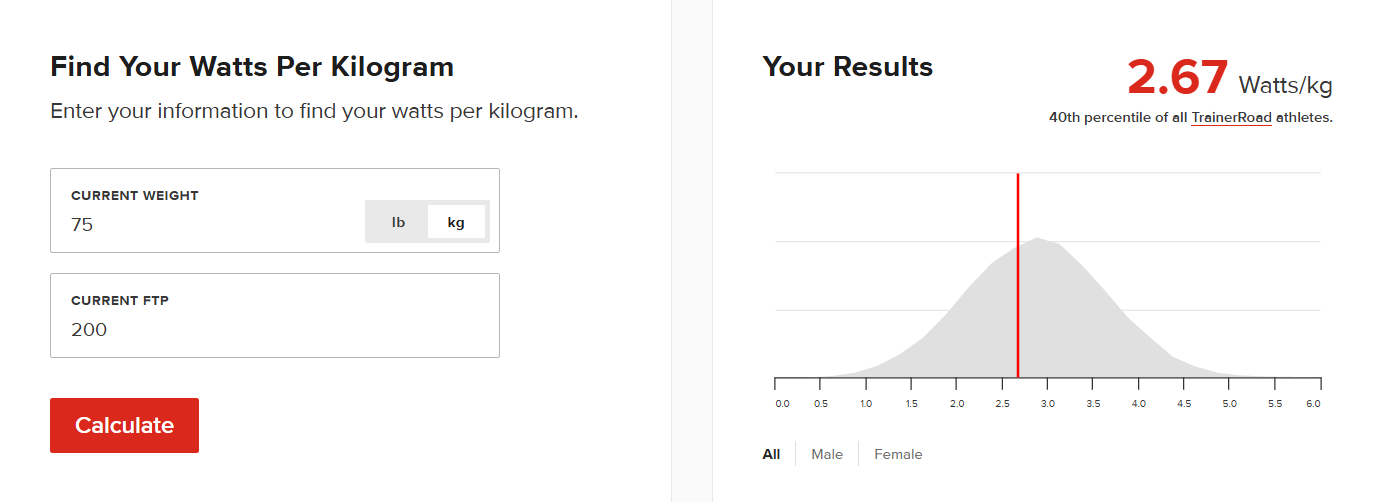
Average FTP of All TrainerRoad Athletes
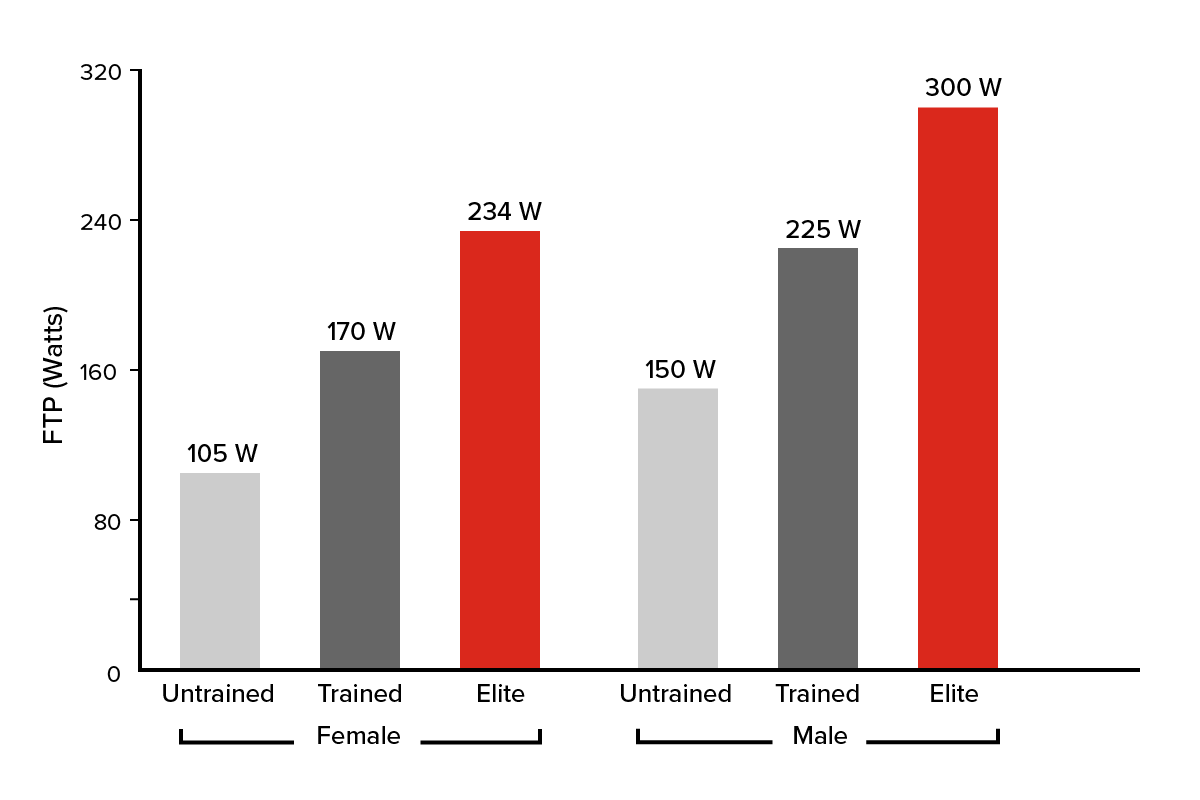
| Female | Male |
| Untrained: <105 W | Untrained: <150 W |
| Trained: ~170 W | Trained: ~225 W |
| Elite: >234 W | Elite: >300 W |
On average, Trained athletes hold a ~70w higher FTP when compared to untrained athletes, and at the elite level you can see a ~140w difference. With consistency, power-based structured training can raise your FTP, improve endurance, and increase overall performance. You can get faster with TrainerRoad’s customizable plans guiding you through the process, day by day, workout by workout.
Raw power matters, but watts per kilogram (W/Kg) can give a more complete view by factors in your body weight. W/Kg can be especially helpful if your goals involve climbing or longer endurance rides.
Average W/kg of All TrainerRoad Athletes
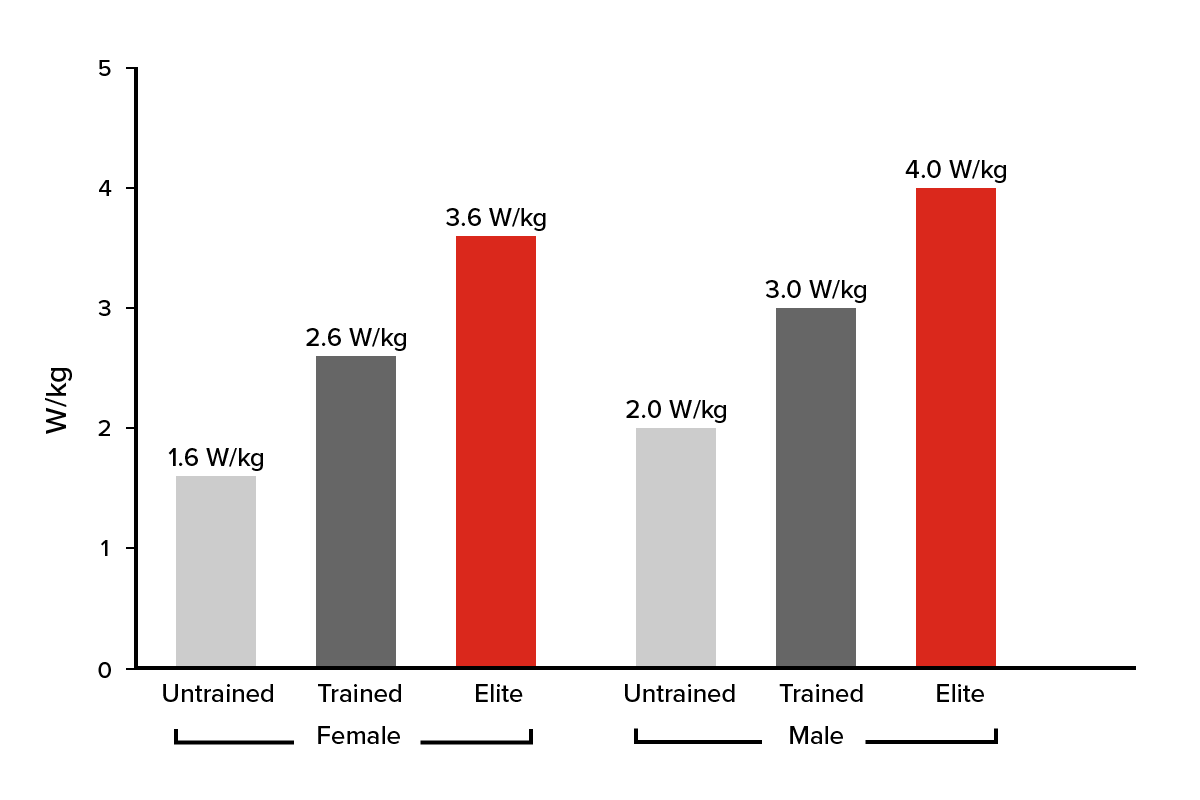
| Female | Male |
| Untrained: <1.6W/kg | Untrained: <2W/kg |
| Trained: ~2.6W/kg | Trained: ~3W/kg |
| Elite: >3.6w/kg | Elite: >4W/kg |
W/Kg considers both power and body weight, making it a valuable performance metric. But FTP and W/Kg are tools, not rules. The better you utilize these metrics, the faster you can become, and a lower starting point simply means more room to grow. With TrainerRoad structured plans, understanding and improving these metrics is straightforward.
Below is an Ask A Cycling Coach Podcast on how to improve your W/Kg:
Adaptive Training
Get the right workout, every time with training that adapts to you.
Check Out TrainerRoadShould I focus on Power or Weight?
While dropping weight can boost this ratio, increasing your raw power output tends to be healthier and more sustainable in the long run, helping you maintain energy levels and muscle mass.
- Long-Term Progress: Power-based improvements often come with better overall fitness and health markers, whereas focusing primarily on weight loss can lead to short-term gains and potential compromises in strength, recovery, and long-term performance.
- Performance-Focused Approach: By emphasizing improving your power numbers instead of just cutting weight, you prioritize building stronger muscles, better endurance, and more robust aerobic capacity—all of which translate into faster speeds and greater resilience.
Below is an Ask A Cycling Coach Podcast clip on how to focus on power when working on weight loss goals:
How to Test Your FTP Accurately
Methods to Determine Your FTP
Frequent FTP testing or detection keeps your training aligned with your current fitness.
AI FTP Detection
Once you’ve established your FTP and done a few structured workouts, TrainerRoad can automatically estimate your FTP without a test. This makes tracking your FTP progress easy, giving you more time to focus on training.
Other Testing Methods:
- Ramp Test: Quick, incremental steps of increased power until you can’t continue. It’s less daunting than a traditional 20-minute all-out test and usually takes about 20 minutes.
- 20-Minute FTP Test: A classic assessment in which you ride at a maximal, steady effort for 20 minutes. Your FTP is then estimated as approximately 95% of your average power from that effort.
- 8-Minute FTP Test: A shorter, two-interval test in which you ride as hard as you can for two separate 8-minute efforts with a brief rest in between. Your FTP is then estimated based on the average power you can hold across these intervals.
We recommend testing your FTP every 4-6 weeks, ensuring your training remains both challenging and productive. Or let AI FTP Detection do the job for you automatically!
Adaptive Training
Get the right workout, every time with training that adapts to you.
Check Out TrainerRoadProven Strategies to Improve Your FTP

There are three essential principles to getting faster and raising your FTP.
- Consistency: Consistent training fosters gradual physiological adaptations, improving aerobic capacity, muscle efficiency, and the ability to sustain higher power for longer efforts—ultimately driving continuous performance gains.
- Structure: Structured training maximizes fitness and goal attainment through targeted, progressive workouts. TrainerRoad’s custom plans align with your schedule, maintain optimal training stress, and provide guardrails against long-term fatigue.
- Recovery: Recovery is where adaptations occur and strength is solidified. Without it, you won’t progress. TrainerRoad integrates recovery weeks and Fatigue Prevention measures, ensuring timely rest and steady improvement.
TrainerRoad structured training plans set you up to be successful with all three.
Adaptive Training
Get the right workout, every time with training that adapts to you.
Check Out TrainerRoadTraining Tools and Resources to Support FTP Gains
Use technology and platforms to improve your FTP and gain real-time power feedback for more precise training.
Power Meters & Smart Trainers
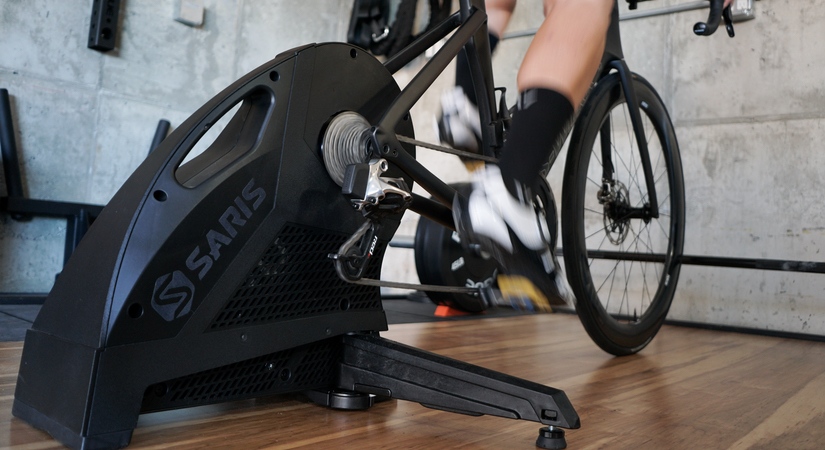
Get the most out of your training with the right equipment to support your training goals.
TrainerRoad Training plans
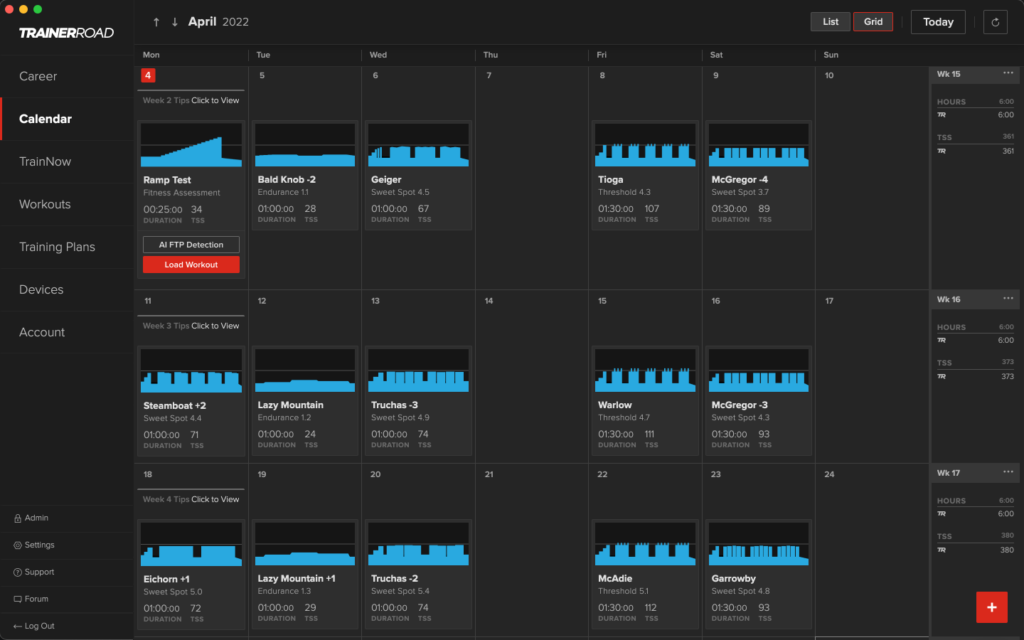
Automatically adjusts your workout intensities based on performance trends and recent results.
Workout Library & Analytics

Access a vast library of proven workouts and in-depth analytics to see exactly where and how you’re improving.
There are a ton of platforms and services out there. Why not give TrainerRoad a try—risk free for 30 days.
Adaptive Training
Get the right workout, every time with training that adapts to you.
Check Out TrainerRoadCommon Mistakes to Avoid When Trying to Improve FTP
- Overtraining and Excessive Volume: Applying too much training load without adequate rest leads to chronic fatigue and diminished returns. It’s essential to balance volume and intensity—TrainerRoad ensures progressive workloads aligned with your capabilities, preventing overreaching.
- Under-Recovery: Adaptations occur during rest, not during the workout itself. Skipping recovery days or neglecting proper sleep and nutrition compromises long-term gains, focus, and motivation. TrainerRoad’s built-in recovery weeks and Fatigue Prevention measures help you maintain the right balance, allowing for steady improvement.
- Random or Unstructured Training: Without a well-defined plan, you risk stagnation and plateauing. TrainerRoad’s data-driven approach and customizable plans eliminate guesswork, guiding you through targeted workouts that foster consistent progress.
- Impatience and Mismanaged Intensity: FTP improvements are incremental and not linear. Pushing too hard or aiming for rapid gains only leads to frustration and burnout. Trust the process. You can rely on TrainerRoad’s precise intensity prescriptions, and celebrate the steady advancements that compound over time.
Adaptive Training
Get the right workout, every time with training that adapts to you.
Check Out TrainerRoadAdditional Factors That Influence Your FTP
Beyond Training: Lifestyle, Nutrition, and Mental Resilience
- Sleep Quality: Adequate sleep is essential for effective recovery and adaptation.
- Nutrition: Nutritious and carb-rich meals keep your body performing at its best. Fueling before, during, and after rides sustains your efforts and growth.
- Stress Management: Hard days and work stress can impact training performance. Don’t let it get you down. Be mindful of how you are feeling, and allow yourself to choose alternate workouts when you have had a hard day.
- Mindset: It takes many small consistent steps to progress. That can be daunting when looking at the bigger picture, and there will be setbacks. Focus on what you can do in the present to be consistent, to promote your growth in the long term.
Setting Realistic Goals and Next Steps
Embrace a Growth Mindset
Instead of aiming for an arbitrary FTP number, focus on personal growth over time. Whether your goal is completing a century ride, taking on a tough climb more confidently, or boosting your endurance for an upcoming event, focusing on the process and being consistent will maximize your progress. TrainerRoad will meet you where you are, and steadily guide you to build towards your goals.
Key Actions:
- Aim for Steady Improvement: Track how your FTP evolves and how you feel on the bike. Progress is rarely linear. Being consistent in the present will improve your progress in the long-term.
- Plan Around an Event or Personal Milestone: Pick a race or event, or create your own challenge. Whatever your goal is, TrainerRoad makes the process to get there efficient and obtainable.
- Let TrainerRoad Handle the Details: TrainerRoad automatically adjusts your plan so you always get the right workout to maximize your training time.
Adaptive Training
Get the right workout, every time with training that adapts to you.
Check Out TrainerRoadAchieve Sustainable FTP Growth with a Structured Approach
Your cycling journey is personal. Your goals—be it completing a century, making the podium, or feeling strong on your weekend spins—are uniquely yours. TrainerRoad supports you in achieving your goals at every step, with structured training plans and Adaptive Training that adjust each workout to your fitness. You’ll know exactly what to do next, and you’ll never have to worry about overreaching or undertraining. More than just measuring improvement, TrainerRoad actively guides you toward becoming the strongest, fastest cyclist you can be.
Adaptive Training
Get the right workout, every time with training that adapts to you.
Check Out TrainerRoadFAQ On FTP
Listen to Certified Cycling Coaches Discuss FTP Testing
Low FTP is one topic we covered in episode 26 of the Ask a Cycling Coach podcast. Listen to the episode’s full recording below to hear this, and other questions from cyclists get answered by our certified cycling
For more answers to your cycling training questions, listen to our podcast Ask a Cycling Coach — the only podcast dedicated to making you a faster cyclist. New episodes are released weekly.
Adaptive Training
Get the right workout, every time with training that adapts to you.
Check Out TrainerRoad

